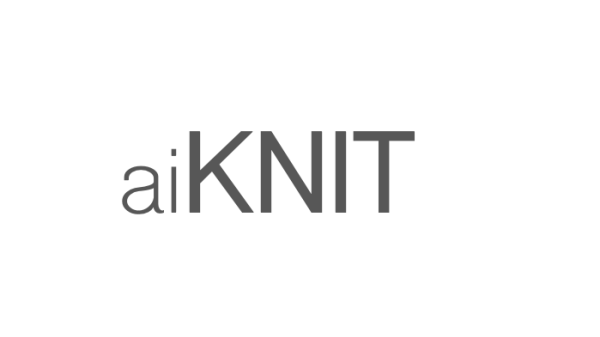aiKNIT
FOUNDER(S): SOPHIE RICHTER
THE COMPANY
AIKNIT is founded and led by Sophie Richter, an interdisciplinary designer and creative technologist. Sophie has a background in material and healthcare design which allows her to think creatively across disciplines and scales. Throughout her career, as a designer at BMW Group in Munich or during her time as a Visiting Scholar at MIT Boston and Imperial College, Sophie developed cutting-edge material technologies that found their way into various products, from cars to clothing to assistive devices.
The idea of AIKNIT was born in 2022 during my master's in healthcare & design at Royal College of Art where I started exploring the mechanics of programmable textile structures and its impact on the musculoskeletal system. I was curious to see if I can develop functional wearable skins that would interact with our joints during movement to provide support and aid in healing. After graduating I joined the MedTech SuperConnector at Imperial College where I received my first funding with which I brought together a small diverse team of designers, scientists and clinicians. I subsequently received further grant funding through WEInnovate at Imperial College, Innovate UK & Zinc and Innovation RCA to develop our first prototypes, start user testing and patent our technology.
THE PROBLEM
1.7 billion people worldwide are suffering from the pain of musculoskeletal disorders. This is more than one in four people on the entire planet. The rapid growth of an ageing population is exacerbating this problem, as an increasingly large proportion of people are at risk of living a poor quality of life. Alone 500m people suffer from arthritis conditions, and this number is expected to grow to 1.2 bn people by 2050. The financial burden is massive and expected to reach a global cost of over $100 billion by the next decade.
This demands the development of novel solutions, as current devices are based on old legacy technology and haven't seen any innovation in years.
THE SOLUTION
AiKNIT fuses digital material practices, cutting edge technology, and a deep empathy for the human body, to create a paradigm shifting experience in the approach to healing musculoskeletal disorders.
It is a novel material approach for the design of programmable wearable devices that can change their material characteristics such as stiffness, density and elasticity, to support a patient's treatment and recovery from musculoskeletal disorders. The adaptive devices are designed using 3D knitting and 3D printing technologies and will fit the patient’s anatomical and physiological needs in a highly personalised fashion to facilitate faster and more effective healing with lesser side effects and shorter treatment times.
The first product will be a body conforming kinematic patch with adaptive functionality and support, which can be adjusted to the patient’s condition and symptoms over time.
This has direct effects on the user, providing necessary care while retaining the patient’s body functionalities.
TOP TIPS
Embrace failure and uncertainty! Stay persistent.
It takes time to develop your ideas and solutions. Ideas may change or may need to pivot.
It is about how persistent you are and how you can adapt to different situations.
Remain joyful and find pleasure in the day-to-day challenges!
The process can be challenging and at times daunting, but never lose the joy and pleasure that comes with forging your own path.
Remain curious, imaginative and adaptive.
When you remain flexible, curious and adaptive you can see possibilities that unfold along the way that may help the business grow in unexpected ways.
Start small, but think big!
ALMUNI : Imperial College London & Royal College of Art

